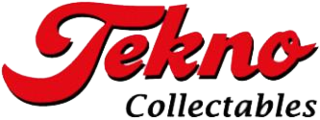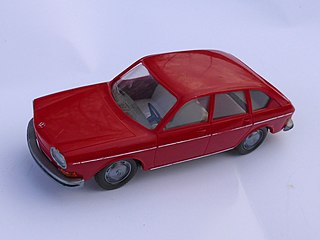Dinky Toys was the brand name for a range of die-cast zamak zinc alloy scale model vehicles, traffic lights, and road signs produced by British toy company Meccano Ltd. They were made in England from 1934 to 1979, at a factory in Binns Road in Liverpool.
Corgi Toys (trademark) is the brand name of a range of die-cast toy vehicles created by Mettoy and currently owned by Hornby.
A model commercial vehicle is a scale model or die-cast toy that represents a commercial vehicle, such as a truck (lorry) or bus.

A die-cast toy is a toy or a collectible model produced by using the die-casting method of putting molten lead, zinc alloy or plastic in a mold to produce a particular shape. Such toys are made of metal, with plastic, rubber, glass, or other machined metal parts. Wholly plastic toys are made by a similar process of injection molding, but the two methods are distinct because of the properties of the materials.
Spot-On models was a brand name for a line of diecast toy cars made by Tri-ang from 1959 through about 1967. They were manufactured in 1:42 scale in Belfast, Northern Ireland, of the United Kingdom. Competition for Spot-On in the British Isles were Corgi Toys and Dinky Toys. The line was particularly British and rarely produced marques from other countries.
1:43 scale is a popular size of die-cast model cars in Europe, Asia and the US. It has its origins in the British / European O scale for model trains and the rise of certain accessories made for that scale which since have become popular in their own right. Models in this scale are 10–13 cm length.

Tekno is a Danish manufacturing company of scale model trucks and other vehicles, currently headquartered in De Lier, Netherlands. Originally established and based in Copenhagen, Tekno began manufacturing construction toys in 1928 and model vehicles immediately after World War II, selling 1 million a year during its peak.

Conrad GmbH is a German manufacturer of diecast scale model trucks, primarily in 1:50 scale for use both as toys and promotional models by heavy equipment manufacturers. Conrad is one of the few European diecast companies which have not outsourced production to China or elsewhere in Asia. Conrad Modelle is headquartered in Kalchreuth, just northeast of Nuremberg.

Meccanica Bessana Toys, was an Italian toy manufacturer that produced die-cast scale model cars during the 1960s and 1970s.

Solido is a French manufacturing company which produces die-cast scale models of cars, military vehicles, and commercial vehicles. Vehicles are usually made of a zamac alloy in varying scales.

Stahlberg was a Finnish company producing promotional plastic model cars mainly of Swedish Saab and Volvo automobiles usually in scales between 1:18 and 1:25. Stahlberg mainly molded cars from the 1960s to about 1992, though its modern counterpart, Emek continues to make truck models.

Norev is a French manufacturer of die-cast scale model cars. Traditionally based in Villeurbanne, a suburb of Lyon. It has normally produced modern and vintage European vehicles, especially those of French origin – though Italian, German, British, and American vehicles were also produced. Norev's closest competition was Solido, but that company had more pan-European influence, while Norev was more national in orientation.

Polistil S.p.A. is an Italian toy brand and former manufacturing company headquartered in Milan, with production center in Chiari, near Brescia. Polistil specialized in die-cast and plastic scale model vehicles of all sizes.

Gama is a German maker of toys, usually cars and trucks, dating from before World War I. The company is headquartered in Fürth, Bavaria, near Nürnberg, a traditional German toymaking center. Other German companies that competed with Gama Toys were Schuco Modell and Conrad Models.

Cursor Modell was a German company making models of antique and modern German vehicles. It is best known for its plastic replicas of vehicles mainly of the era 1880 to about 1920, produced for, and sold in, the Daimler-Benz museum in Stuttgart.
Minialuxe is a French manufacturing company that produces and commercialises plastic scale model cars and trucks. The original Établissements Minialuxe was based in Oyonnax, producing models usually made in 1:43 scale, but some larger 1:32 scale vehicles were also manufactured, for example, a Peugeot 403.

Pilen S.A. was a Spanish manufacturing company headquartered in Ibi, Alicante, which produced die-cast scale model cars from the 1970s through the mid-1990s mostly in 1:43 scale. A majority of the castings were inherited from French Dinky. The company was started in the 1960s, diecasting items like colorful metal sailboats and key chains. In the late 1980s, Pilen was apparently bought by AHC of the Netherlands.

Sablon was a Belgian company near Brussels that made diecast zamac toy cars in the late 1960s and early 1970s. Models were mostly in 1:43 scale and were similar in concept to Dinky Toys or Solido.
Société Anonyme de Fabrication d'Injection et de Recherches was a French manufacturing company that produced diecast metal classic veteran and contemporary plastic race cars and other vehicles in the 1960s through the 1970s. It arose out of the previous French toymaker, "Jadali".











